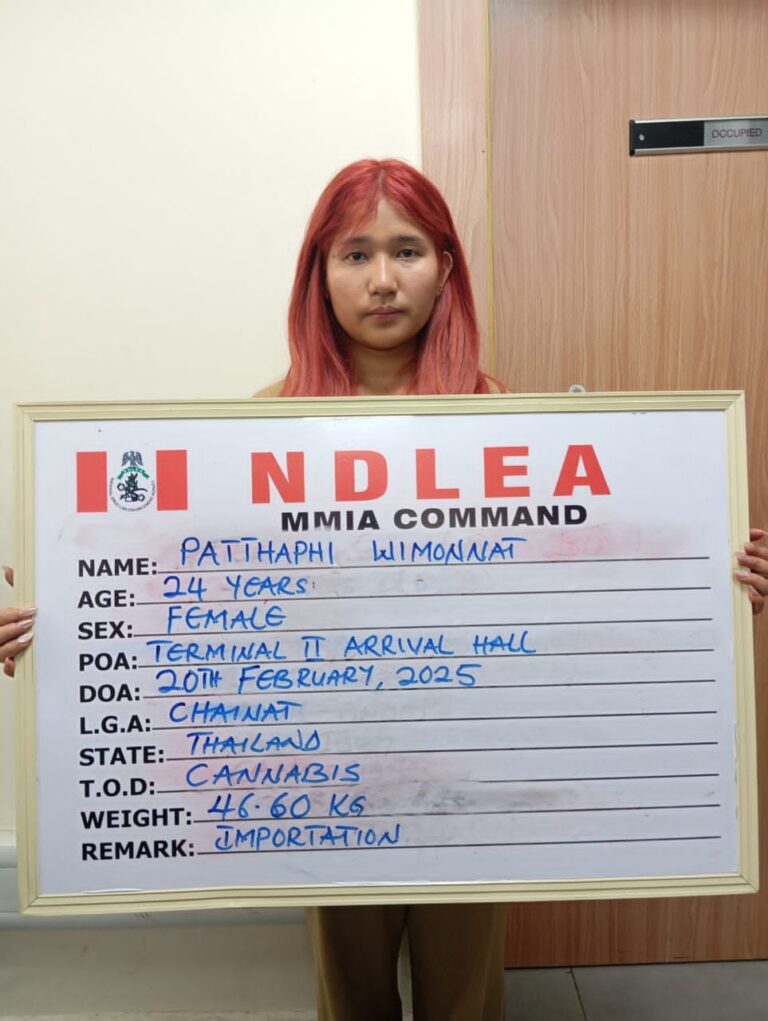
Armed robbers dare Governor, strike hours after launching of new security initiative
Armed robbers dare Governor, strike hours after launching of new security initiative
In a shocking turn of events, armed robbers stormed Imoh Street by Afokang Road in Calabar late Thursday night, leaving several residents wounded in a brazen house-to-house robbery spree.
This attack comes just hours after Cross River State Governor Bassey Otu had issued a stern warning to criminals, including armed robbers, announcing the launch of a new security initiative, Operation Okwok.
The governor, who also donated 30 vehicles to bolster the state’s security efforts, had expressed his readiness to tackle crime head-on.
Among the victims was Miss Alice Dickson, an HND student at the College of Health Technology, Calabar, who is studying Environmental Health Sciences.
She was caught up in the attack, highlighting the growing concern for safety in the region, despite the governor’s recent security measures.
Alice narrated, “They arrived in the night, well armed. They used heavy irons to hit our doors and pushed the front door down.
“They used torchlights. They manhandled me and my sisters. They collected the money I withdrew earlier in the day to pay my school fees. They collected our phones, and other valuables.
“They also burgled my neighbours’ rooms. They entered other apartments before they left. There was no help from the police. I am very scared to sleep in the house because they could come back.”
During the launch of the ‘Operation Okwok’ security outfit, Governor Otu reiterated his administration’s unwavering commitment to enhancing security across the state. The new initiative is set to replace the ‘Operation Apakwu’ program established by his predecessor, Prof. Ben Ayade.
A statement by Mr Gill Nsa, Chief Press Secretary to Gov Otu said, “This marks the first phase of a larger plan to deploy a total of 100 vehicles to enhance security operations across the state.
“The joint task force comprises personnel from the Nigerian Army, Police, Air Force, Navy, Department of State Services, DSS, Immigration Service, and Correctional Service.
“Cases of kidnapping have declined significantly, and robbery is nearly nonexistent.
“These achievements are due to the dedication of our security forces.
“Anyone who threatens the peace of the state will face the full weight of the law,” he warned.
In his address, the State Security Adviser, Major General Okoi Ubi Obono (Rtd), hailed the initiative as a significant milestone in the state’s battle against crime.
He also highlighted the importance of the name ‘Operation Okwok’, explaining that “Okwok” is an Efik term meaning “bee.”
“Don’t let the sweetness of the bees fool you. Bees are highly territorial and fiercely protect their hive.
“Just like that, Operation Okwok is here to secure Cross River— producing honey when needed but stinging when provoked.”
News
Young Lady caught with boxes of illicit drugs at the airport, reveals how much she was promised for the job

Young Lady caught with boxes of illicit drugs at the airport, reveals how much she was promised for the job
The National Drug Law Enforcement Agency (NDLEA) has detained a 24-year-old Thai woman for prosecution after she was caught with prohibited substances at the Murtala Muhammed International Airport (MMIA) in Ikeja, Lagos.
NDLEA’s Director of Media and Advocacy, Mr Femi Babafemi, said this in a press release on Sunday in Abuja.
Babafemi said that the woman was allegedly found in possession of 43 parcels of Canadian Loud, a synthetic strain of cannabis, weighing 46.60 kilograms.
He said that the NDLEA operatives had discovered the illicit consignments in her boxes while attempting to smuggle them into Nigeria through the Lagos Airport
He said that the suspect, who allegedly confessed to being a hired drug trafficker was arrested on Thursday.
Babafemi stated that she was intercepted during the inward clearance of passengers on a Qatar Airways flight from Thailand via Doha, Qatar, at the arrival hall of Terminal 2 at Lagos airport.
“She said the drug cartel, which recruited her promised to pay her $3,000 (about N4.5 million) upon successful delivery of the illicit drug consignment in Nigeria,”he said.
Meanwhile, Babafemi reported that NDLEA operatives foiled another attempt by a drug trafficking syndicate to smuggle 68 parcels of Ghanaian Loud, weighing 42.2kg.
According to the NDLEA spokesman, the drugs were hidden within the walls of crated cartons and were destined for London, UK, via the export shed at Lagos airport.
“Three suspects: a freight agent and two dispatch riders were initially arrested in connection with the seizure.
“This was before the mastermind of the shipment, was swiftly traced to his Exodus Estate, Ajah, Lagos home where he was arrested,”he said.
Babafemi also said that the operatives also intercepted 49 cartons containing 49,000 pills of Tamol at the Port Harcourt Port Complex, Onne, Rivers, by NDLEA officers on Thursday.
Hr disclosed that the drug which was a brand of Tramadol 225mg was discovered in a 40ft container during a joint examination of the shipment with men of Nigeria Customs Service,(NCS) and other security agencies.
In another development, Babafemi said that in Nasarawa state, NDLEA operatives on Saturday, arrested two suspects at Kokona/Keffi with 517kg of skunk.
Babafemi said that two other suspects were nabbed in a Toyota Corolla car conveying 62.7 kilograms of skunk along Sabon Asibiti road Kontagora, Niger on Thursday.
“Also, With the same vigour, commands and formations of the agency across the country continued their War Against Drug Abuse, (WADA), sensitisation activities to schools, worship centres, work places and communities among others in the past week.
“This includes WADA sensitisation lectures to students and staff of Maku Grammar School, Tapa, Oyo state as well as Comprehensive Secondary School, Orogwe, Imo.
“Others include, Jama’atu Islamiyya Secondary School, Ankpa, Kogi state; and Owerri-Aba Primary School, Ugwunagba, Imo state, among others,” he said.
Babafemi quoted the NDLEA Chairman, Brig. Gen. Buba Marwa(rtd) as commending the officers and men of MMIA, PHPC, Niger, and Nasarawa Commands of the agency for the arrests and seizures.
“Marwa stated that their operational successes and those of their compatriots across the country, especially their balanced approach to drug supply reduction and drug demand reduction efforts were well appreciated,” Babafemi added. (NAN)
News
ANALYSIS: When Husband and Wife can no longer live under same roof

ANALYSIS: When Husband and Wife can no longer live under same roof
Kennett and Clara knew that their marriage was plunging but they were reluctant to go their separate ways due to fear of societal condemnation and the rigour of securing divorce from a high court.
Their union became toxic two years ago when Kenneth began to suspect that Clara was cheating on him. This resulted in frequent conflicts that often degenerate to fights. Kenneth also lost respect and submission from Clara.
Little did they know that a recent fight at night over late return by Clara will end her life.
As usual, they started with verbal attacks and then went into physical fight during which Clara hit her husband hard on the private part and he strangled her to death.
Many couples like Kenneth and Clara are stuck in soured, toxic and abusive marriages.
They are reluctant to leave the union for several reasons including their children’s upbringing, protecting their reputation, rigours of securing divorce, and religious beliefs.
Critics say that all the reasons are worthy of consideration but do not worthy dying for.
“ As long as a marriage hasn’t become abusive, those reasons and more should be considered for protecting the marriage.
“However, the moment violence enters into a relationship, the only thing to be considered is the safety of the lives involved,” a marriage counsellor, Mrs Obiageli Okoro, argues.
She also argues that although it is the duty of high courts to dissolve marriages contracted under the Marriage Causes Act, couples in abusive marriages can separate from each other to avert tragedies.
Okoro warns that it is dangerous for a couple to still live together waiting for divorce when they can no longer stay without fighting.
Mr Ogedi Ogu, Country Director of Advocacy for Justice and Accountability is convinced that although high courts reserve jurisdiction to dissolve registered marriages, an embattled couple is at liberty to seek “first aid” in the form of judicial separation.
According to him, no law compels a spouse to die in an abusive marriage.
“For every marriage that has turned toxic, it is safe for the parties to stay slightly apart for their individual safety.
“In as much as it is the law that only a court of law can grant dissolution of marriage contracted under the Marriage Act, it is not the law that they must continue to co-habit until such marriage is dissolved.
“It is rather a ground for dissolution where it is shown that a party has deserted the marriage and the husband and wife have lived apart for a period of at least one year or two years.
“However, notwithstanding the toxicity of such a union, the dissolution of marriage is only granted by a high court where the marriage is contracted under the Act,” he argues.
The country director also notes that customary marriages are dissolved by the customary court.
Mrs Ebere Obiora, Ogun Coordinator of African Women Lawyers Association, notes that the Matrimonial Causes Act is the law under which statutory marriages are contracted.
According to her, the same statute vests jurisdiction on high courts only, to entertain cases arising from marriages contracted under the Act.
“However, an abused partner may not wait in a toxic marriage until his/her petition for dissolution of marriage is granted.
“The grant of marriage dissolution terminates the marriage, but delays associated with divorce proceedings may be a deadly trap for the abused partner.
“This calls to mind that the Marriage Causes Act also made provisions for a petition for judicial separation, which is a softer order of court concerning a failing marriage,” she says.
According to Obiora, judicial separation prohibits physical contact of the parties, but does not terminate the marriage.
She explains that this means that the partners remain in the marriage and, therefore, cannot re-marry.
“Unlike a divorce petition, an application for judicial separation may be brought at any time during the marriage where violence is proved.
“The grant of judicial separation, therefore, relieves parties from co-habitation and, more importantly, gives room for resolution of issues between partners, which may lead to reconciliation,” she adds.
She advises that judicial separation should not prevent filing of a petition for dissolution of the marriage, where there is no positive improvement in the relationship.
“The affected parties are free to apply to the court for dissolution of the marriage,” she says.
A Principal Partner at Ayoola Chambers, Lagos, Mr Julius Ayoola, emphasises that dissolution of a marriage depends on the type of marriage contracted by the couple.
He argues that dissolving a marriage that has broken down irretrievably is not the exclusive preserve of a high court.
According to him, a marriage contracted solely under customary principles will be dissolved in a customary court.
“In some customary marriages, the parties may decide to return the bride price.
“In Igbo culture, a customary marriage is deemed dissolved once the bride price has been returned,” he says.
Ayoola, however, says the high court may be interested in the custody and welfare of children produced by customary marriages.
“The high court has jurisdiction over the welfare of the children,” he says.
A Professor of Law and Senior Advocate of Nigeria (SAN), Samson Erugo, believes that it is not necessary for a high court to dissolve a marriage before the couple can live apart.
“That rule does not accord with reality, and most times, it works out hardship in practice.
“In some jurisdictions, parties could, by marriage dissolution agreement or mediation, agree to separate.
“Such an agreement could also be filed in court and adopted by the parties without the stress of a trial.
“I think this liberal approach should be adopted in Nigeria, in every established case of marriage that has broken down irretrievably,” Erugo argues.
He is convinced that requirement of a high court order to dissolve a marriage is rooted essentially in the Christian culture of sanctity of marriage.
“It is part of our colonial heritage and has been easily embraced by some local cultures that try to protect the marriage institution.
“While these arguments may still be strong, modern reality should provide exceptions,” he says.
Analysts urge intensified efforts in ensuring safety of lives of couples in abusive marriages, while protecting the marriage institution and ensuring the welfare of the children. (NANFeatures)
News
Why Babangida was not appointed as my ADC – Former Nigerian reveals

Why Babangida was not appointed as my ADC – Former Nigerian reveals
In a surprising revelation, former Nigerian military Head of State, General Yakubu Gowon, Rtd, disclosed that he almost appointed General Ibrahim Babangida as his Aide-de-Camp (ADC) during his tenure.
Gowon, who served as the country’s military leader through the tumultuous Nigerian Civil War, shared this personal insight in the Foreword of Babangida’s memoir, ‘A Journey in Service’, which was officially launched in Abuja on Friday.
The ex-military leader expressed pride in both Babangida’s career and the remarkable journey chronicled in the book.
Highlighting their long-standing association, Gowon reflected on his first encounters with Babangida, whom he first met as a young officer.
The two have remained close throughout Babangida’s military and political ascent, with Gowon noting the significant role Babangida has played in Nigeria’s history.
“At some point, I was so impressed by his intellect and outstanding professionalism that he almost became my Aide-de-Camp,” Gowon wrote, adding that “that story belongs elsewhere, and I will leave him to tell it for the benefit of others who did not have the privilege of proximity to our careers.”
“I can assert with pride that General Babangida was arguably one of the most remarkable military officers this country is blessed with.
“Brilliant but unassuming, gifted but sociable, a natural leader but also a devoted follower, Ibrahim was destined for great things. It did not come as a surprise when it pleased God to elevate him to the summit of political leadership in our country’s days of military rule.
“In the post-civil war period, his tenure in office is easily the most remarkable in the lineup of military leaders that our nation has witnessed. I say this without equivocation for so many reasons.
“Unlike some of us, his seniors, he tried to be the best of two opposing worlds. He sought to be an officer and a gentleman in the finest tradition.
“At the same time, he had unusual political sophistication and savvy, which enabled him to freely navigate the complex world of politics without losing grip of his command and control of the military establishment.
“He was proud of his military background, just as the military institution remained proud of his achievements in the political management of the nation.”
-
5 years ago
Our situation in Kano terrible – Gov Ganduje cries out
-

 News2 weeks ago
News2 weeks agoFG pledges commitment to enhance Police officers Welfare, implement Tinubu’s 8-point agenda for NPF
-

 News1 month ago
News1 month agoDPO under investigation for allegedly taking teenage girl to his home while in police custody
-

 News4 weeks ago
News4 weeks agoJUST IN; Commissioner of Police bows out of Service
-

 News3 weeks ago
News3 weeks agoJUST IN; IG of Police orders Police Commands to involve PCRC in their operations
-

 News4 weeks ago
News4 weeks agoBREAKING; NLC declare nationwide protest
-

 News4 weeks ago
News4 weeks agoJUST IN: 30 graves, shrine dangerous weapons found inside Hotel
-

 News1 month ago
News1 month agoBREAKING; President Tinubu commissions Bola Ahmed Tinubu Barracks




